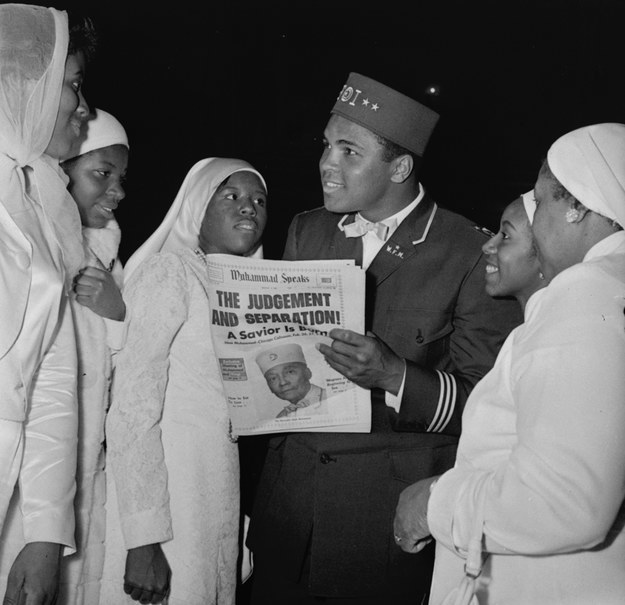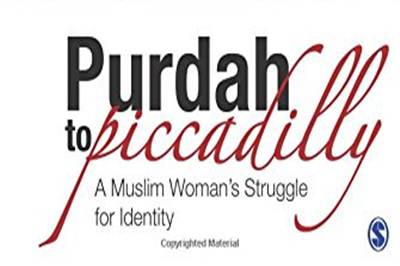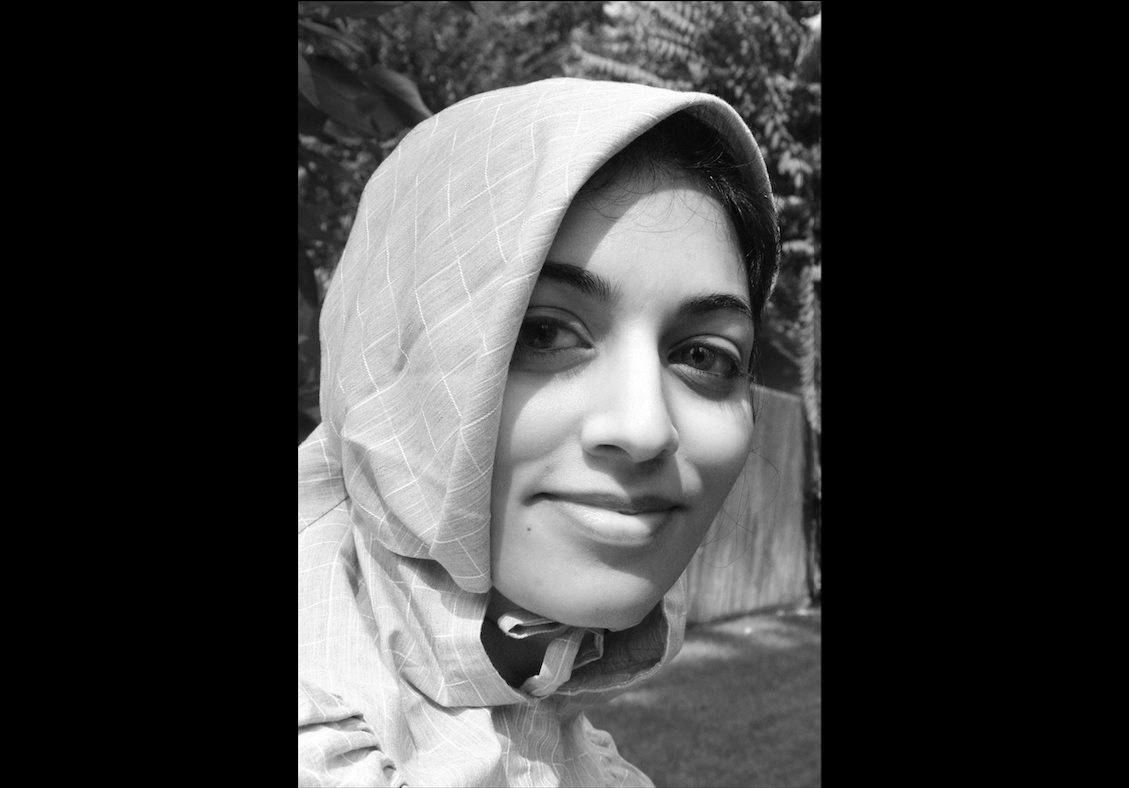With all the stories on the Internet it can be difficult to always stay in the know. To help, we’ve searched the web for interesting pieces of news, videos and tips to help you start off your week on the right foot.
1. Muslims reflect on Muhammad Ali’s legacy

Muhammad Ali with members of the Black Muslim organization on Feb. 26, 1966, in Chicago. Ali converted to Islam in 1975. AP Photo
BuzzFeed News spoke with several leaders within the Muslim American community about the impact Muhammad Ali had on shaping the perception of Muslims in the United States. Although Ali was raised Baptist, he converted to the Nation of Islam in 1964 and shortly after changed his name from Cassius Clay to Muhammad Ali. Then, in 1975, he converted to Sunni Islam.
Ali died on Friday after a 30 year battle with Parkinson’s disease. The official cause of his death was septic shock. The infamous boxer was known for his passion and firm belief in Islam.
Rabiah Ahmed, a spokesperson for the Muslim Public Affairs Council, told BuzzFeed News that said the [Muslim] community should feel indebted to him and his work.
“He was able to help our faith and community gain so much respect that no other individual in current days has been able to achieve,” she said.
[tweetthis]Muslims reflect on the luminous legacy of Muhammad Ali.[/tweetthis]
2. She dreams of being the worlds first hijabi ballerina

Stephanie Kurlow has started a fundraising campaign on LaunchGood so she can train full time at a professional ballet school. Stephanie Kurlow/Instagram
In Sydney, Australia Stephanie Kurlow is hoping to become the world’s first hijabi ballerina.
Kurlow converted to Islam in 2010. Shortly after she gave up performing because she believed “there would be no way” for her to become a professional ballet dancer. There were no local studios that agreed to accommodate her hijab — they had dress codes.
Now, 14-years-old, Kurlow credits her inspiration to continue following her dreams to the first female African-American ballerinas, Michaela DePrince and Misty Copeland. As well as Amna Al Haddad, the first Emirati lifter to compete in the hijab and Noor Tagouri, the first hijabi news anchor to appear on United States television.
Despite support from family and friends, Kurlow receives hateful messages from others that accuse her aspirations of dance as haram.
Kurlow said she believes that performing arts can be a way to bring people together.
“In this day and age, there is a lack of facilitation for youth who are disengaged or of a different religion or race,” Kurlow said. “I want to encourage everyone to join together no matter what faith, race or color. To bring harmony and a world of acceptance for future generations.”
[tweetthis]14-year-old Stephanie Kurlow wants to be the world’s first hijabi ballerina.[/tweetthis]
3. Fatou Bensouda: the woman who hunts tyrants

“There must be justice, there must be accountability … that drives me,” Bensouda said. Judith Jockel/the Guardian
From an early age Fatou Bensouda said she felt the powerful drive of right versus wrong. “The issue of justice and accountability seems to be … in my DNA,” she said. “I just feel I have this [sense] – and I’m sure many people do, huh? – but there must be justice. There must be fairness. As soon as I was able to know and analyze certain injustices in society around me, I wanted to do something about it.”
Bensouda is the chief prosecutor of the international criminal court in The Hague, a city in the Netherlands. The institution was established, according to the Guardian, with the “intention of ending impunity for war criminals and genocidal tyrants across the world who might otherwise have considered themselves above the law.”
Now 55-years-old, Bensouda took over as the ICC’s most senior prosecutor in 2012. A decade after the court was established, she was elected to replace the post’s inaugural holder, Luis Moreno Ocampo. According to the Guardian, her position makes her one of the most powerful African, Muslim women in the world.
[tweetthis]Fatou Bensouda, senior prosecutor of the international criminal court says she felt a powerful sense of right and wrong from an early age.[/tweetthis]
4. Book review: Purdah to Piccadilly — A Muslim woman’s struggle for identity

Purdah to Piccadilly — A Muslim Woman’s Struggle for Identity is written by Zarina Bhatty. It is a tale of a middle class Muslim girl named Zarina Bhatti. Born and raised in pre-parition India, the book centers on Zarnia’s experiences of trying to break out of the stereotypical roles that confine her. Chronicling her life as it is planned out for more than 80 years, the books works to marry Zarnia’s story with the political and social conditions of India’s post independence.
5. Sweden stirs debate with women-only swimming pools

Children play in the paddling pool at the European Village in Kungstradgarden Park during the Eurovision Song Contest in Stockholm earlier this month. Pontus Lundahl / TT News Agency / Reuters
During the last few months, 13 of Sweden’s 100 largest municipalities have begun offering separate swimming hours for men and women. “Our facilities are used by 40 percent women and 60 percent men,” Johan Hermansson, the head of Malmö’s recreations department, told TV4. “Our ambition is for them to be used equally by girls and boys, men and women.”
However, according to the Christian Science Monitor, the trend is more than just reaching 50-50 visitor figures. For years Swedish city’s have conducted their pools to be mixed-gendered. By adding women-only hours, officials are hoping to better accommodate the country’s growing Muslim population.
The separation of swimming hours seems to have caused debate, with some calling the move “regressive and a ghettoization of women” while others see it is a “sensible inclusion of the country’s increasingly diverse population.”
In May Sweden’s democracy minister, Alice Bah Kuhnke, told Swedish TV that “gender-segregated swimming hours — as the system is often referred to — are problematic and called mixed-gender swimming a victory after many years and generations of gender-equality struggle.”
[tweetthis]Sweden faces heated debate over the offer of women-only pool hours to accommodate the country’s growing Muslim population.[/tweetthis]
[tweetthis]altM’s weekly roundup of news[/tweetthis]
This list was curated by Kaitlin Montgomery, altM News Editor




